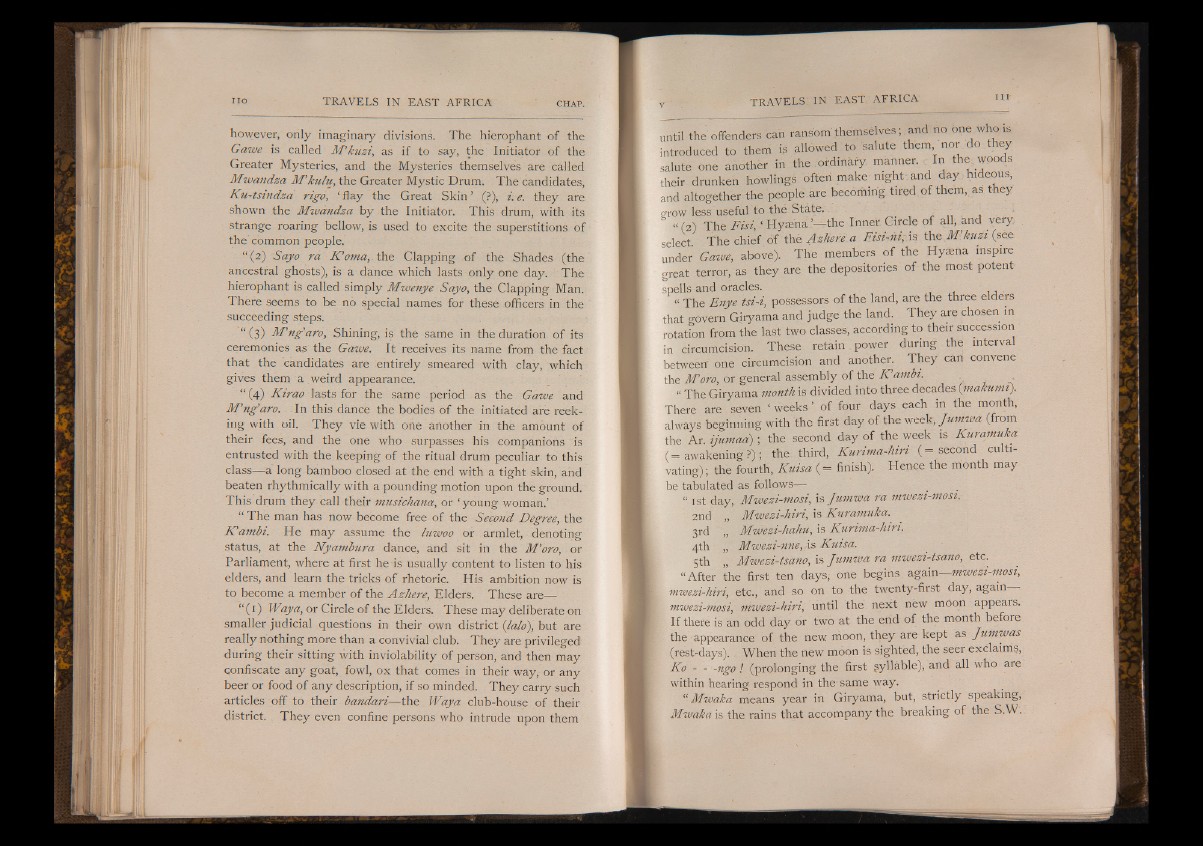
however, only imaginary divisions. The hierophant of the
Gawe is called M ’kuzi, as if to say, the Initiator of the
Greater Mysteries, and the Mysteries themselves are called
Mwandza M'kulu, the Greater Mystic Drum. The candidates,
Ku-tsindza rigo, ‘ flay the Great Skin’ (?), i.e. they are
shown the Mwandza by the Initiator. This drum, with its
strange roaring bellow, is used to excite the superstitions of
the common people.
“ (2) Sayo ra K'oma, the Clapping of the Shades (the
ancestral ghosts), is a dance which lasts only one day. The
hierophant is called simply Mwenye Sayo, the Clapping Man.
There seems to be no special names for these officers in the
succeeding steps.
I (3) M'ng'aro, Shining, is the same in the duration of its
ceremonies as the Gawe. It receives its name from the fact,
that the candidates are entirely smeared with clay, which
gives them a weird appearance.
“ (4) Kirao lasts for the same period as the Gawe and
M'ng'aro. In this dance the bodies of the initiated are reeking
with oil. They vie with one another in thè amount of
their fees, and the one who surpasses his companions is
entrusted with the keeping of the ritual drum peculiar to this
class— a long bamboo closed at the end with a tight skin, and
beaten rhythmically with a pounding motion upon the ground.
This drum they call their musichana, or ‘ young woman.’
“ The man has now become free of the Second Degree, the
Kambi. He may assume the Inwoo or armlet, denoting
status, at the Nyambura dance, and sit in the M ’oro, or
Parliament, where at first he is usually content to listen to his
elders, and learn the tricks o f rhetoric. His ambition now is
to become a member of the Azhere, Elders. These are—
“ (1) Way a, or Circle of the Elders. These may deliberate on
smaller judicial questions in their own district (lalo), but are
really nothing more than a convivial club. They are privileged
during their sitting with inviolability of person, and then may
confiscate any goat, fowl, ox that comes in their way, or any
beer or food of any description, if so minded. They carry such
articles off to their bandari— the Way a club-house of their
district. They even confine persons who intrude upon them
until the offenders can ransom themsèlves ; and no one who is.
introduced to them Is allowed to salute them, nor do they
salute one another in the .ordinary manner. In the., woods
their drunken howlings often make night-.and day hideous,
and altogether the people are becoming tired of them,, as they
grow less useful to thé State;.
I (2) The Fisi, I Hyaena’— the Inner Circle of all, and very,
select The chief of thè Azliere a Fisi-ni;is the M ’kuzi (see
under Gawe, above). The members of the Hyaena inspire
great terror, as they are the depositories of the most potent
spells and oracles.
1 The Enye tsi-i, possessors of the land, are the three elders
that govern Giryama and judge the land. They are chosen in
rotation from the last two classes, according to their succession
in circumcision. These retain power during the interval
betweerr one circumcision and another. They can convene
the M’oro, or general assembly of the K ’ambi.
. The Giryama month is divided into three decades (makumi).
There are seven ‘ weeks ’ of four days each in the month,
always beginning with the first day of the week, Jumwa (from
the Ar. ijumaa) ; the second day of the week is Kuramuka
(= awakening?); the third, Kurima-hiri (= second cultivating);
the fourth, Kuisa (= finish). Hence the month may
be tabulated as follows—
I Ist day, Mwezi-mosi, is Jumwa ra mwezi-mosi.
2nd „ Mwezi-hiri, is Kuramuka.
3rd „ Mwezi-kaku, is Kurima-hiri.
4th „ Mwezi-nne, is Kuisa.
5th „ Mivezi-tsano, is Jumwa ra mwezi-tsano, etc.
“After the first ten days, one begins again mwezi-mosi,
mwezi-hiri, etc., and so on to the twenty-first day, again
mwezi-mosi, mwezi-hiri, until the next nëw moon appears.
If there is an odd day or two at the end of the month before
the appearance of the new moon, they are kept as Jumwas
(rest-days). When the new moon is sighted, the seer exclaims,
Ko - - -ngo ! (prolonging the first syllable), and all who are
within hearing respond in the- same way.
“ Mwaka means year in Giryama, but, strictly speaking,
Mwaka is the rains that accompany the breaking of the S.W,